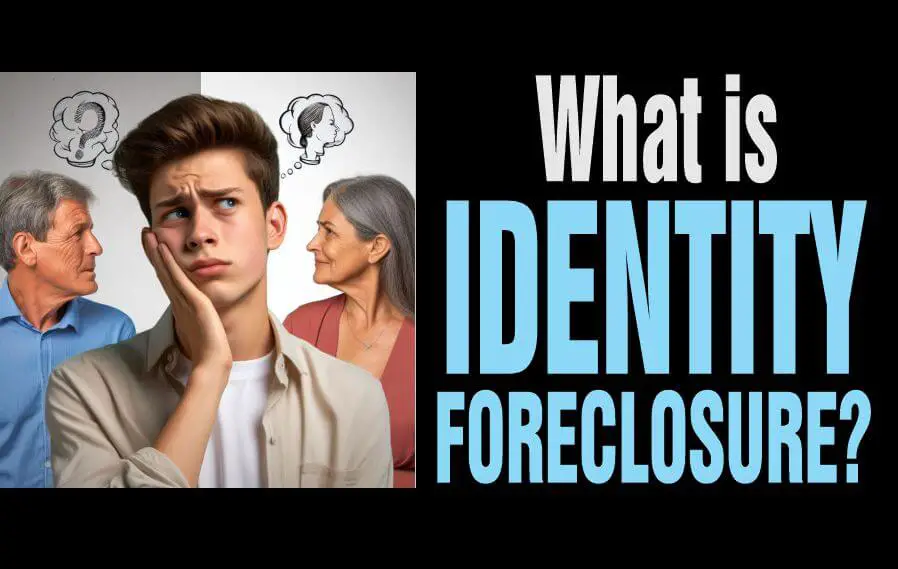Identity foreclosure is a defect in identity development that most teenagers encounter on their journey to self-discovery. Here is how to overcome it.
Development of personal identity occurs throughout our lives, influenced by numerous factors such as family, peers, education, and culture.
However, not all individuals go through a thorough exploration of different identity facets, leading to a phenomenon known as “identity foreclosure” or premature identity establishment.
In this article, we will explore the concept of premature identity establishment, its causes, consequences, and potential ways to overcome it.
Related: What is Identity?
What is Identity Foreclosure?
Identity Foreclosure Definition
It is a term coined by psychologist James Marcia in 1966, and describes the process in which an individual prematurely commits to an identity without adequately exploring alternative possibilities.
These individuals often adopt a pre-determined identity handed down by their parents, society, or cultural norms, without questioning or critically examining alternative paths.
They tend to clutch onto societal expectations, conforming to predetermined roles, beliefs, and values, without considering other potential identities available to them.
Suggested: Understanding Your Personality
What Determines Identity Foreclosure?

There are several reasons why individuals may experience premature identity establishment.
One significant factor is the influence of parents or family. During childhood and adolescence, the family plays a crucial role in shaping an individual’s identity.
Upbringing
Parents may inadvertently or purposefully transmit their own values, aspirations, and expectations to their children, steering them towards a predetermined path.
This can limit the child’s exploration of alternative identities, forcing them into a preconceived mold.
Related: Understanding Identity Formation
Societal and Cultural Expectations
Societal and cultural expectations can also impose constraints and pressure on individuals to conform to specific roles and identities.
Gender norms and expectations, for instance, can significantly influence premature identity establishment.
Society assigns roles and expectations based on gender, dictating how individuals should behave, dress, and pursue their aspirations.
This societal pressure can restrict the exploration of diverse identity options and lead to premature identity establishment.
Related: What is Your Sense of Self?
Internal and External Pressures
Furthermore, internal and external pressures to conform, achieve success or meet certain standards can contribute to premature identity establishment.
Adolescents, in particular, face tremendous pressure to know who they are and what they want to be in the future.
They may rush into commitments or decisions without fully exploring alternative options, fearing the consequences of not conforming to societal expectations.
Also Read: What is Identity Achievement?
Consequences of Identity Foreclosure
The consequences of premature identity establishment can be both personal and societal.
1. Personal Consequences
On an individual level, individuals who experience premature identity establishment may struggle with a lack of authenticity and fulfillment.
They may feel a sense of discomfort or internal conflict, as their adopted identity may not align with their true interests, values, or aspirations.
This can lead to feelings of confusion, disappointment, and even resentment.
Moreover, individuals who have limited their exploration of alternative identities may have difficulties adapting to changes or challenging life events.
When their predetermined identity no longer fits their circumstances or beliefs, they may struggle to adjust.
This can lead to feelings of frustration, anxiety, and a sense of being trapped in an identity that no longer resonates.
Suggested: What Determines Identity Diffusion?
2. Societal Consequences
Societally, identity foreclosure can contribute to conformity and a lack of diversity.
When individuals follow predetermined paths without critically examining their identities, it inhibits the growth and evolution of society.
It limits innovation, stifles creativity, and perpetuates narrow-mindedness.
A society that encourages exploration and self-discovery, on the other hand, benefits from a wide range of perspectives, ideas, and talents.
Related: Balancing Personal and Social Identities
Examples of Identity Foreclosure
- A teenager who has blindly accepted the religious beliefs of their parents without questioning or exploring other perspectives.
- A young adult who has chosen to pursue a specific career path because it is what their family expects, without considering other options or personal interests.
- Someone who adopts a specific political ideology solely because their social group or community strongly supports it, without critically evaluating their own beliefs and values.
- A person who feels pressure to conform to societal expectations of gender roles and identities without exploring or questioning their own true identity.
- A teenager who decides to continue studying a particular subject in university solely because their high school teacher recommended it, without considering their own interests and passions.
Related: The Dangers of Identity Foreclosure
Overcoming Identity Foreclosure

Overcoming premature identity establishment requires a deliberate and introspective approach.
It begins with recognizing that identity is not a fixed and unchangeable state but a fluid and evolving concept.
It necessitates a willingness to explore different facets of oneself, question societal expectations, and search for authenticity and personal fulfillment.
1. Self-reflection
One way to overcome premature identity establishment is through self-reflection and introspection.
By examining our beliefs, values, and aspirations, we can identify the extent to which they align with our true selves or have been influenced by external factors.
Engaging in activities that encourage self-exploration, such as journaling, meditation, or therapy, can assist in this process.
Related: How to Overcome Identity Crisis
2. Seek Out New Experiences and Perspectives
Another strategy is to actively seek out new experiences and perspectives.
Surrounding ourselves with diverse individuals, cultures, and ideologies can challenge our preconceived notions and open up new possibilities for self-discovery.
Additionally, pursuing a wide range of hobbies, interests, and educational opportunities can help broaden our horizons and expose us to alternative identities.
3. Challenging Societal Expectations and Norms
Lastly, it is crucial to challenge societal expectations and norms.
Recognizing that societal roles and expectations are man-made constructs can empower individuals to question and redefine their own identities.
By challenging gender norms, cultural expectations, and societal pressures, individuals can break free from premature identity establishment and embrace their authentic selves.
Related: Understanding Social Identity
Frequently Asked Questions
What determines identity foreclosure?
Identity foreclosure is determined by the premature establishment of a self-identity without adequate exploration of alternatives, often based on the desires and expectations of others.
What is the identity status of foreclosure?
The identity status of foreclosure involves prematurely adopting an identity without exploration, often based on external influences rather than independent self-reflection.
What is identity diffusion and foreclosure?
Identity diffusion is characterized by confusion and uncertainty about one’s self-identity, while identity foreclosure entails prematurely establishing an identity without adequate exploration.
What is the Danger of identity foreclosure?
The danger of premature identity establishment lies in limiting personal growth and adaptability, as individuals may struggle to pursue their authentic aspirations and adapt to changing circumstances.
What defines identity moratorium?
Identity moratorium is defined by active exploration and consideration of different identity options without committing to a specific set of values, beliefs, or life goals.
Wrapping Up
Identity foreclosure is a phenomenon in which individuals prematurely commit to an identity without adequately exploring alternative possibilities.
It is often influenced by parents, societal expectations, and internal pressures.
The consequences of premature identity establishment can lead to personal dissatisfaction, lack of authenticity, and difficulties adapting to change.
Overcoming premature identity establishment requires self-reflection, seeking new experiences, and challenging societal expectations.
Embracing a fluid and evolving understanding of identity can lead to personal fulfillment and a more diverse and vibrant society.
References:
- https://helpfulprofessor.com/identity-foreclosure/
- https://eric.ed.gov/?id=EJ183071
- https://www.bartleby.com/essay/Identity-Foreclosure-Theory-1A35E754E95F2E56
- https://deepstash.com/idea/270594/identity-foreclosure
Pyo Merez (PsyD) is a distinguished adolescent and adult psychologist at the forefront of mental health advocacy.
With expertise in cognitive and developmental psychology, focusing on social relationships, cultural contexts, and individual differences, Pyo has dedicated his career to empowering adolescents and adults.
As a sought-after speaker and panelist, Pyo shares invaluable insights on issues affecting young people, contributing to a deeper understanding of mental health and well-being in today's society.

